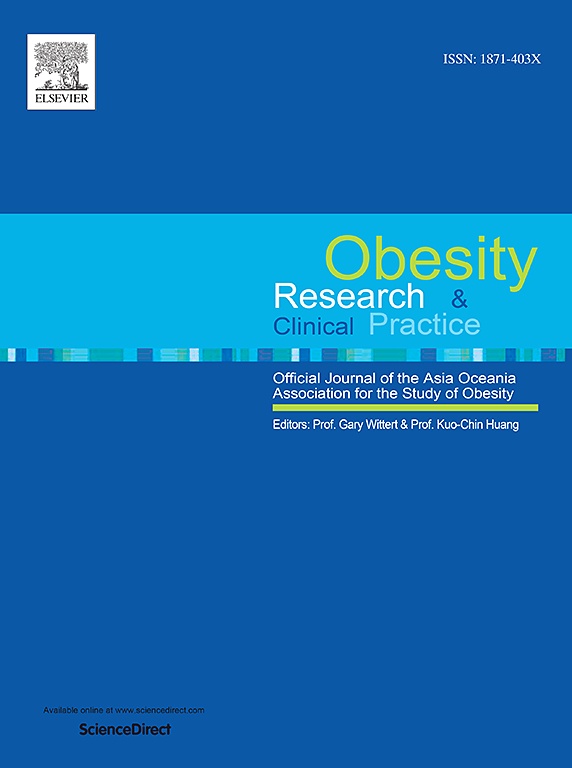鱼油对肥胖小鼠肾周脂肪组织表观遗传调控的影响
IF 2.5
4区 医学
Q3 ENDOCRINOLOGY & METABOLISM
引用次数: 0
摘要
研究表明,鱼油(FO)是omega-3多不饱和脂肪酸(n-3 PUFA)的来源,通过改变参与脂肪生成和脂肪细胞代谢的基因表达,为小鼠提供部分保护,使其免受高脂肪饮食(HFD)的不利影响。组蛋白3赖氨酸27 (H3K27)修饰因子,即Ezh2, Kdm6a, Kdm6b, Crebbp和Ep300,对脂肪细胞的适当分化和代谢至关重要,因为它们可以沉默或激活转录。肥胖患者肾周脂肪组织(AT)的扩张与许多并发症有关,包括高血压和肾脏疾病。本研究的目的是利用实时荧光定量PCR技术评估hfd喂养和fo处理(5DHA:1EPA)小鼠肾周AT中H3K27修饰因子和脂肪生成及脂肪细胞代谢相关基因的表达。本研究首次证明,高脂肪饮食(HFD)增加了肾周AT中Kdm6b (H3K27去甲基化酶)的表达,而鱼油治疗可以完全逆转这一作用。相反,Acly基因(编码一种为组蛋白乙酰化酶提供底物的酶)的表达在饲喂hfd的小鼠中被发现减少,并且这种情况没有被FO处理逆转。此外,转录因子基因,如Tbx1,在喂食HFD的小鼠肾周AT中表达减少。这些观察结果表明,HFD影响肾周AT中染色质修饰因子、转录因子和代谢基因的表达,而FO可以逆转这些影响,为肥胖的治疗提供了一个有希望的途径。本文章由计算机程序翻译,如有差异,请以英文原文为准。
Impact of fish oil on epigenetic regulation in perirenal adipose tissue of obese mice
It has been demonstrated that fish oil (FO), a source of omega-3 polyunsaturated fatty acids (n-3 PUFA), offers partial protection to mice from the adverse effects of a high-fat diet (HFD) by altering the expression of genes involved in adipogenesis and adipocyte metabolism. Histone 3 lysine 27 (H3K27) modifiers, namely Ezh2, Kdm6a, Kdm6b, Crebbp and Ep300, are vital for the appropriate differentiation and metabolism of adipocytes, as they can either silence or activate transcription. The expansion of perirenal adipose tissue (AT) in obesity is associated with a number of complications, including hypertension and kidney disease. The aim of this study was to assess the expression of H3K27 modifiers and genes involved in adipogenesis and adipocyte metabolism in perirenal AT of HFD-fed and FO-treated (5DHA:1EPA) mice using real-time PCR. This study demonstrates, for the first time, that a high-fat diet (HFD) increases the expression of Kdm6b (H3K27 demethylase) in perirenal AT, and that treatment with FO can completely reverse this effect. Conversely, the expression of the Acly gene, which encodes an enzyme that provides a substrate for histone acetylases, was found to be reduced in HFD-fed mice and this was not reversed by FO treatment. Additionally, transcription factor genes, such as Tbx1, exhibited diminished expression in perirenal AT of mice fed an HFD. These observations suggest that a HFD affects the expression of chromatin modifiers, transcription factors, and metabolic genes in perirenal AT, and that FO can reverse some of these effects, offering a promising avenue for the treatment of obesity.
求助全文
通过发布文献求助,成功后即可免费获取论文全文。
去求助
来源期刊

Obesity research & clinical practice
医学-内分泌学与代谢
CiteScore
7.10
自引率
0.00%
发文量
80
审稿时长
49 days
期刊介绍:
The aim of Obesity Research & Clinical Practice (ORCP) is to publish high quality clinical and basic research relating to the epidemiology, mechanism, complications and treatment of obesity and the complication of obesity. Studies relating to the Asia Oceania region are particularly welcome, given the increasing burden of obesity in Asia Pacific, compounded by specific regional population-based and genetic issues, and the devastating personal and economic consequences. The journal aims to expose health care practitioners, clinical researchers, basic scientists, epidemiologists, and public health officials in the region to all areas of obesity research and practice. In addition to original research the ORCP publishes reviews, patient reports, short communications, and letters to the editor (including comments on published papers). The proceedings and abstracts of the Annual Meeting of the Asia Oceania Association for the Study of Obesity is published as a supplement each year.
 求助内容:
求助内容: 应助结果提醒方式:
应助结果提醒方式:


